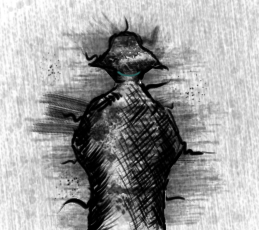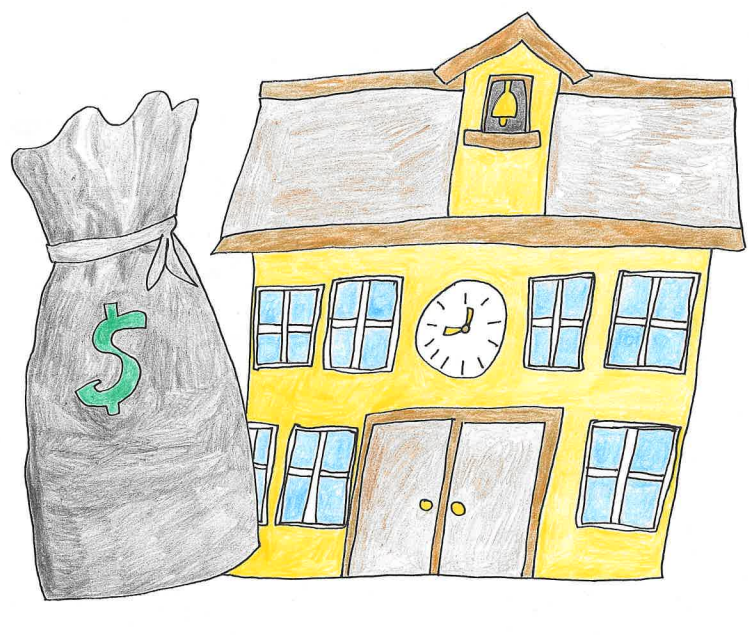First, there was a loud clang. Then, there was a resounding flutter. It was some great machine, more dreadful in nature than in stature. The grand machine barely fit through the front gates, and the mere sight of it brought on an unusual sensation. The town was small — built out from a dry, empty desert from which no life seemed to escape. It appeared plain and dusty, but the overbearing heat extended for miles in all directions. For years, now, the land had been controlled by great masses of foam and polymer, stretching out from the ground and engulfing people in masses of absolute safety, but this luxury was only afforded to so many, and in the quickly morphing climate, one had to find some semblance of a home.
The town was beyond small. It consisted of twelve houses, organized in the shape of a small circle. The walls of the homes were thin and sparsely filled in cheap woods, and the roofs were highlighted with the slightest hints of tin and copper, but mostly with thin plating carved from stone deep below the soil.
Murphy slowly rose from his bed, groggily and slightly perplexed by the racket all around him. Every single Sunday morning at 5:30 a.m., a great metal beast of a truck pulled in, barely quietly enough to avoid disquieting the slumber of the people. Every single morning at this time, he would walk outside in his finest white suit, and have a short exchange with the moisture men. There were two of them — a taller one in a black suit who ran the truck, and a shorter one in a dark gray suit, who had great dimples by his mouth and eyes as though he had been greeting people for so long that his hospitality was etched into his face. Every single Sunday, he signed the papers and brought them a burlap sack from each member of the town. Every time, they hooked the great bronze hose of their truck to the tank at the center of town and slowly filled the great glass sphere with water, usually no more than three-fourths full.
It was, then, some great surprise when stirring from bed, Murphy realized that it was a Sunday, and that his clock read 7:26. Even moreso did it catch him as a surprise, when rather than the timid pull of an old truck fronted by two men too jaded to care, he heard the resounding screech of the halt of something which sounded far, far larger — and a bit too unwieldy to evade.
Rising quickly from bed, Murphy dusted off the suit he had fallen asleep in, and stuck his head out the window. The old flat-faced truck he had known for years was replaced with a great metal beast, with massive horns on either side and two glowing white headlights like a predator, which hatefully eyed its prey. On the back, rather than the same steel tubes of matter used by every truck he had seen in his twelve years as mayor, he saw a great glass beaker, filled to the brim with water.
Quickly, he withdrew his head from the window, causing a resounding “THWACK!” as he pulled away. He exhaled deeply as he cautiously bolted from his quarters to the stairs downward. He felt a sinking sensation in his stomach as he paced outside to the center of the town and beheld what he had feared: a complete stranger, a slight smile plastered across their face, smiling as they paced up and down.
The stranger donned a light beige suit and a white dress shirt beneath it. Their pants were a bright shade of blue, and atop their head, they donned an old, decorationally wide-brimmed hat. They donned dark brown boots stretched upward to their ankles, and everything about them appeared neatly and cleanly organized. Murphy felt an instinctive sense of offense at the mere sight of the man. He often wore his white suit several dozen times before putting it through a wash. His boots, which he was seldom seen without, were stained with dried mud which unmistakably impressed the form of his feet, and there was a tattered look to the old wide-brimmed cap he had worn for several years. To Murphy, a man’s appearance was the arms and legs of his values — and by this, the new moisture man’s values must have been antithetical to what Murphy stood by.
The Moisture Man’s face did not seem to shift as he looked about, some static apparition before them — unflinching in nature. And as the moisture-man began to speak, Murphy’s indignation evolved to rage.
“Moisture is the salt of the earth. You cannot mistake it, hm? It’s drying up, our wonderful planet… honeyed words won’t stop that. Soon you’ll all shrivel, and soon none among you will have a leg’s worth of agency. I say, the men will be thankful for moisture salesmen. Without us, the earth could have been saved.”
It took great effort for Murphy not to strike the bastard on sight. He shook his head, slowly, and tilted his head in indignation.
“… I have moisture men withstanding on notice. I don’t need a new supplier.”
He leaned in, his bright green eyes staring holes through the moisture man’s, the color of which being obscured by the shadow of his hat.
“Go away, if you know what’s good for you.”
The moisture man paced past Murphy, glancing at the centralized water-tank, which was one-third full. He smirked, slightly, at the sight of it.
“Men might get scared, water gets low. Pull out their torch, set fire to everything in sight. I imagine you’d be dead of a riot before you were dead of a thirst. I reckon it’s best if a man like you listens to what a man like me has to say.”
Just then, Mrs. Grelch, one of the older citizens, headed out, her eyes obscured by the reflection of the light along her glasses. She appeared off-put, eyes wide. She adjusted her glasses. Murphy wished with every fiber of his being to push her aside, but bit his tongue, recognizing that she held a great deal of seniority over him, even if he was the mayor. She looked at him with the same scrutiny Murphy did, but with far more of the confidence which only came from years of life, and a remarkable lack of anxiety.
“Well, I am sorry, Mr. Moistures Bringer, but we have a few rules around here. Over in your polyester paradises, it may be normal to.. Intrude on a new city. You might think it’s yours! Everything seems to belong to you, doesn’t it? But I am afraid -”
The Moisture Man paced back to his truck, holding a tall glass of water in his hands. He reached out to the spurt and allowed a steady flow of water to enter his glass. Once the glass was full, it measured far larger than any glass they had previously seen. The moisture man brought the glass to his mouth and began to drink the water. His motion was slow and deliberate — going on for upwards of thirty seconds, and drinking far more than one would want to drink in such a short span. Murphy, growing increasingly furious, gathered the tobacco remnants in his mouth, and spat into the moisture man’s glass. The yellowy green mass stirred through his glass of water — and yet, to great shock and discomfort, he drank the rest of the glass unfazed.
When he was through, the Moisture Man dropped his glass to the ground, causing a resounding shattering noise, which rang through the building. Turning around, he paced toward the front of Mrs. Grelch’s home, his hand still positioned as though there was glass in it. Murphy reasoned, in this moment, that the man was like some variety of Komodo dragon — a great dangerous thing which could swallow men whole, but which was far too dim of the mind to use his strength with any extent of restraint, let alone subtlety.
In the doorway, Mrs. Grelch’s stepson, Charlie, peeked outward, his hair messy. He had evidently awoken mere moments ago. The moisture-man shook his head. “No, no. In the big city, the oldest women have a great sum of wealth, because of countless dead husbands, years worked, and privileged families. This one is plain old. They don’t have wealth. Wealth takes a lot of forms.”
Charlie, mistaking the situation, walked out, and glanced at the moisture man.
“You look a lot like the ones who bring the moisture.”
Murphy bolted toward Charlie, grabbed the young man’s wrist, and pulled him away from the moisture man — eyes widened.
“… Leave this man be,” he said, but the man already continued.
The Moisture Man paced back to his truck, pulling the great hose from its interior. Manipulating the spout, he placed it into the small throat of their water-reserves, and releasing a hatch, allowed a great stream of water to flow into the hatch, smiling as he glanced at it. “Hydration is a blessing for ants like you. You’re lucky the lions don’t give a damn.”
The Moisture Man climbed back into his truck, awkwardly shuffling into the driver’s seat. Murphy approached with a furious expression, but the moisture-man only shook his head — the same lizard-esque stare into space he always offered.
“Your payment is staggered. Do not worry. I will accept proper compensation in twenty four hours order.” Murphy tried to climb atop the truck – not quite sure of what type of aggression he might throw the man’s way, but the truck accelerated at ten times the speed he had expected. In mere moments, they were off in a trail of bastard-dust.
Mrs. Grelch tended to her stepson, glancing over him for evidence of anxiety or fear. A few local doors opened — Randall and Miss Grenald stood on each of their doorsteps — but Murphy stood at the edge of the road, mouth tightly curled shut. His unkempt beard swayed, if slightly, in the gentle breeze, as he watched the truck tumble away — squinting, doing his best to see in what direction it stretched. Without turning to see who was trailing toward him, he spoke in a murmur, his mouth barely in motion.
“Fetch me a telephone. I reckon we aren’t safe until those men are gone, and I’ve got a few contacts.”
The rest of the day was a waking fever dream for Murphy. Most days he would have spent on his couch reading, in bed dreaming of what would come when this dry age ended or tending to the fields outside in the hopes they might grow a full crop. His home appeared not unlike that of the rest of the civilians, save for a widow’s peak which his mother and father had installed prior to their passing — one which he walked when mulling over matters of water distribution — and as the people eyed the bank of water at the center of town, Murphy walked the peak. It bent and buckled beneath his walk, as though it might break at any moment. But he only paced each day. He kept the telephone receiver pressed against his ear the whole time — pressed so hard he began to hear an ambient ringing. Mostly, however, he just stood, awaiting the eventual sound of another human being.
To be continued…









